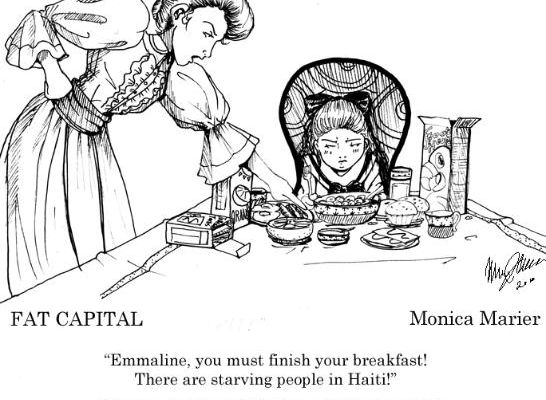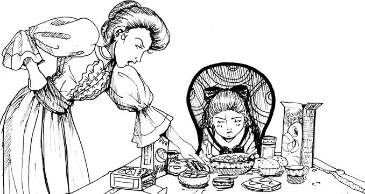The Fat Diaries: Throwing Away That Last Bite
“Eat everything on your plate. People are starving in China.”
We’ve all heard and misunderstood this chestnut; if not from our parents, then from some well-meaning authority figure, substituting other countries as they came into vogue. And for those of us who have only heard this phrase on TV or in movies, the sentiment was still there in our homes. Essentially the message was, 1) be grateful that you have enough food to eat and 2) don’t be wasteful. These two well-meaning but outdated ideas on the surface seem harmless enough but they are contributing greatly to the American psychology of overeating.
Let’s go back in time and explore this a little. Over a century ago, the American working class of farmers, loggers, pioneers, etc. had hard grueling days of physical labor. In doing so they required a lot of calories in their diet to keep them going. Breakfast for your average working class in the 19th century would have contained more calories than most men in the 21st Century can burn in a day. Read one of Laura Ingalls Wilder’s books, where she recounts a typical breakfast. You’d think they were re-stocking the brunch buffet at a Holiday Inn.
As various machines were invented to take the grueling work out of household chores people had more leisure time and consequently burned less calories. Unfortunately the gargantuan meals loaded with courses, soups, rich desserts, donuts, and assorted jellies remained the same. America ate large dinners because it had always eaten large dinners, not because they needed the energy.
We skip ahead to the Great Depression, where people are forced to downsize their meals even more, and not necessarily for the sake of health, closely followed by the morale boosting rations of World War II. Is it any wonder than that in the late 40s and early 50s, when America’s wealth started returning, we starting hearing this “people in [country] are starving” phrase? For almost two decades Fat America had been leaner than it had ever been (not even to be compared with the starvation of most of Europe). America plodded on in its patriotic duty with FDR’s promise of “jam tomorrow,” so when America finally got its jam there was a feeding frenzy.
The explosion of supermarket chains and the post-war economy meant that meat was on the menu again–huge fat-covered slabs of meat, usually covered in gravy and little bits of hotdogs on a bed of coleslaw. If you’ve ever been unfortunate enough to view a cookbook from the golden age, you’ll realize I’m not kidding. And along with the artery-clogging meals brought to you by Betty-Crocker, General Mills, Heinz Ketchup and Ritz Crackers was the mentality of “eat because you can.” Decades later, our mentality has held onto this idiom of starving unfortunates despite the fact that most kids of today don’t understand why they are eating anymore.
As a child of the “Captain Planet Age” I understood about not being wasteful. It was wrong to throw out plastic bottles and aluminum cans, right? So it only made sense that throwing food was wrong too. But with the mentality came a false objective, not to eat until I was full, but to eat until I uncovered every inch of the floral-patterned plate. If I felt the first twinges of being stuffed, I must press on and finish the green beans or potatoes or whatever else stood in the way of me being a good child. If I became too full, and had to stop, I’d receive disapproving looks from the adults as I upended my pork chops into the bin. “So wasteful,” I’d hear them cluck. I was a bad American. It wasn’t their fault, for they too had been raised since birth that it was a base sin to leave food on their plate; it meant that the commies had won.
So is it any wonder that Americans are tipping the scale these days? Instead of listening to our stomachs, we’re guilted into eating more than we want, or are even enticed to eat until we burst (with the promise of dessert as a reward). There’s no FDA or USDA regulation that can be levied to counteract this mentality; it’s up to the masses to take a stand. Once again in addition to the countless hours of research into what we eat, we should not neglect the important question of WHY we eat.
I have a memory of when I was 13. Two older girls were taking me to an amusement park for a girl’s day. I didn’t like rollercoasters with big drops in those days (still don’t) so occasionally I’d be obliged to wait at a ride’s exit for my friends. To while away the time, I would buy a drink or a goodie. Late in the day I was waiting outside a ride with an ice cream cone. It was enormous, delicious, and cost three dollars. I had already had a lemonade, a soft pretzel, a hotdog, a funnel cake and three sodas so it wasn’t surprising that after only two or three bites of my ice cream I found myself stuffed to bursting. Yet what could I do? To throw away the ice cream now would be wasteful, not just food-wise but also a waste of three dollars. My friends found me weeping in the depths of despair as only a 13-year-old girl could italicize it.
“What’s wrong?” my friend asked me.
“I just bought this ice cream cone and I can’t eat it!” I moaned.
“Well just throw it away,” she suggested.
I gasped in horror as if she had just suggested I wear it as a hat. “I can’t do that! “I paid three dollars for it!” I added as if to clarify.
“Why not? You paid three dollars to get your fill of ice cream, not to eat it all and be sick.”
It’s funny how I still remember this story to this day. I even remember talking about it with my nutritionist as we discussed the “clean plate” fallacy. Ultimately our goal is NOT to dump tons of food in the trash, but to recognize how much food we actually need to be full and take smaller portions. But the fact of the matter is that we goof up – a lot. As much as we say we’re going to be responsible, it’s so easy to take a larger piece of lasagna or to pile on the side dishes thinking that we’re hungry enough to need it all. What’s important though is that we aren’t afraid of goofing up. It’s okay to throw away that last bite of meatloaf. It’s okay to waste food. It’s not okay to eschew a little waste at the cost of torturing ourselves with eating. So by all means, get your children to take an interest in the sufferings of Haiti and other countries that are in a crisis. Just don’t convince them it’s their patriotic duty to overeat.



